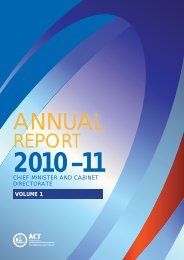Governing the City State - Chief Minister and Treasury Directorate ...
Governing the City State - Chief Minister and Treasury Directorate ...
Governing the City State - Chief Minister and Treasury Directorate ...
You also want an ePaper? Increase the reach of your titles
YUMPU automatically turns print PDFs into web optimized ePapers that Google loves.
inconsistencies between <strong>the</strong> components of <strong>the</strong> employment framework <strong>and</strong> to contribute to<strong>the</strong> overall efficiency of <strong>the</strong> ACTPSIn particular, <strong>the</strong> PSM Act requires significant structural changes in order to establish amodern, flexible, efficient <strong>and</strong> accountable legislative employment structure in line witho<strong>the</strong>r jurisdictions, including <strong>the</strong> APS. In t<strong>and</strong>em with an overhaul of <strong>the</strong> PSM Act <strong>the</strong>re is aneed to review <strong>and</strong> enhance <strong>the</strong> capability <strong>and</strong> capacity of <strong>the</strong> existing ACTPS operationalsystems:InTACT <strong>and</strong> <strong>the</strong> Payroll systems employed by <strong>the</strong> ACT Government are bothoutdated <strong>and</strong> often incompatible with o<strong>the</strong>r software used by departments…. This isvery poor for a modern service trying to operate in a competitive labour market <strong>and</strong>affects <strong>the</strong> reputation of <strong>the</strong> ACT Public Sector. 376There are at least six operational systems 377 covering staff employed under <strong>the</strong> PSM Act. Theexisting operational systems are unable to adapt to <strong>the</strong> increasing dem<strong>and</strong>s of a flexible,modern workforce. For a small organisation <strong>the</strong> complexity of <strong>the</strong> operational systems isillogical, warranting a strategic investment.Central to <strong>the</strong> pursuit of a simpler, more consistent <strong>and</strong> more coherent legislative employmentframework is <strong>the</strong> need to streamline <strong>the</strong> ACTPS enterprise agreements. Single enterpriseagreements covering general classification staff are in place in <strong>the</strong> Victorian, SouthAustralian, Nor<strong>the</strong>rn Territory <strong>and</strong> Tasmanian public sectors. The CPSU has recently lobbiedfor a single agreement at <strong>the</strong> Australian Public Service level.In 2009 <strong>the</strong> Government proposed a single enterprise agreement to consist of agencyschedules for those general classifications currently covered by “common terms <strong>and</strong>conditions” agreements. 378 The proposed single agreement would apply only to employeescurrently covered by common terms <strong>and</strong> conditions <strong>and</strong> specific occupation basedagreements would continue. It’s puzzling that this proposal for <strong>the</strong> ACT was rejected given<strong>the</strong> path <strong>the</strong> CPSU has pursued at <strong>the</strong> Commonwealth level <strong>and</strong> in o<strong>the</strong>r <strong>State</strong>s.Logically, a single agreement would also constitute a more efficient method of conductingnegotiations for union <strong>and</strong> non-union representatives as well as for <strong>the</strong> employer. There arecomplexities associated with a single agreement – none <strong>the</strong> least ensuring buy-in frombargaining representatives (both union <strong>and</strong> non-union).376 Submission No.3.377 Operational systems include those systems that maintain employee records; process payroll, record <strong>and</strong> process leaveentitlements, <strong>and</strong> store <strong>and</strong> report on workforce data.378 A ‘common terms <strong>and</strong> conditions’ agreement is an “agreement” which is reached between Government <strong>and</strong> nominatedbargainers including most unions on specific entitlement matters (including quantum, leave types <strong>and</strong> length ofagreement etc ) that apply across most of <strong>the</strong> ACTPS enterprise agreements as Part One of those agreements. Thecommon terms <strong>and</strong> conditions cannot be bargained away at agency level. Part Two of overall agency agreements(commonly referred to as agency schedule matters) pertain to agency specific matters only which are specific to thatagency <strong>and</strong> can be bargained by <strong>the</strong> agency. The common terms <strong>and</strong> conditions does not normally apply tooccupation based agreements e.g. fire-fighters, doctors , teachers, ambulance officers, nurses etc. However, thoseagreements pick up aspects of <strong>the</strong> common terms <strong>and</strong> conditions.Capability, Capacity <strong>and</strong> Effectiveness: 283



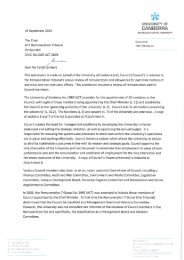
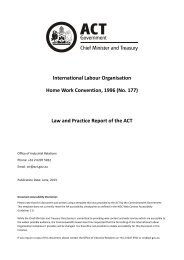
![HSR Training Programs Guidelines [ PDF 191KB]](https://img.yumpu.com/51348280/1/190x245/hsr-training-programs-guidelines-pdf-191kb.jpg?quality=85)


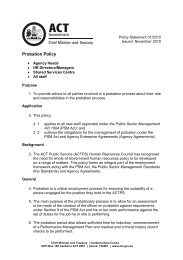
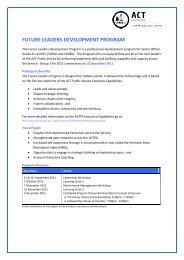

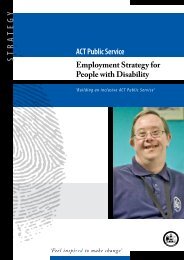
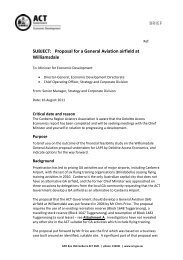
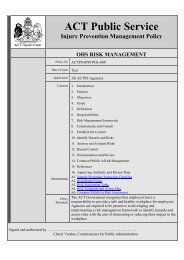
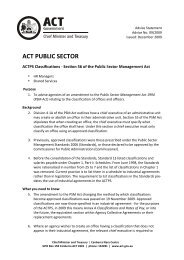
![Teachers Technical and Further Education [ PDF 68KB]](https://img.yumpu.com/34230751/1/184x260/teachers-technical-and-further-education-pdf-68kb.jpg?quality=85)
